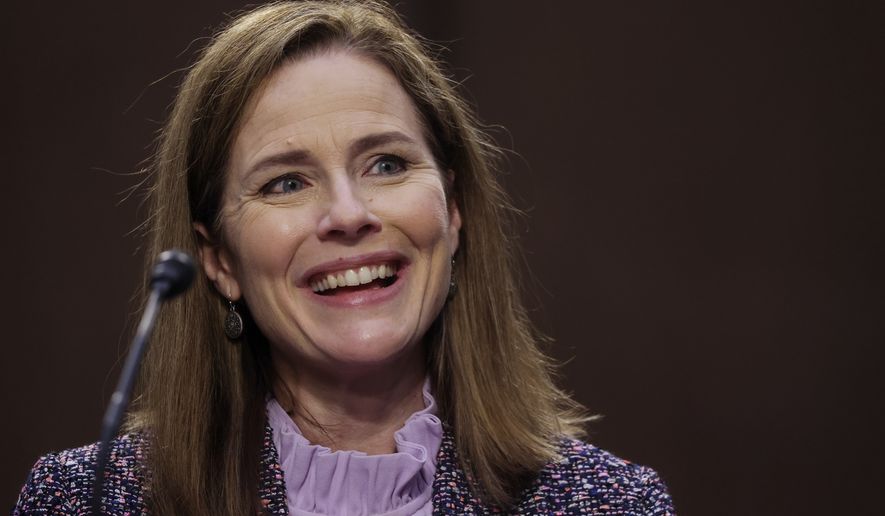Supreme Court nominee Judge Amy Coney Barrett emerged unscathed Wednesday after three days of confirmation hearings, fending off Democrats’ toughest questions and leaving her on a path to be sitting on the high court within weeks.
After a second day of senators’ questions, Republicans cheered the relatively drama-free proceedings. Democrats spent their time attacking President Trump and warning of a health care crisis but mounting few significant challenges to Judge Barrett on her legal views.
Sen. Lindsey Graham, South Carolina Republican and chairman of the Judiciary Committee, said confirming Judge Barrett will shatter the glass ceiling for conservative women and prove to a generation of women that they don’t have to adhere to liberal orthodoxy.
“This is the first time in American history that we have nominated a woman who is unashamedly pro-life and embraces her faith without apology, and she’s going to the court — a seat at the table is waiting on you,” he told the judge.
The second day of questions produced few revelations, though Judge Barrett did get drawn deeper into questions of presidential pardons.
While declining to offer an opinion on whether Mr. Trump could pardon himself if he faced a criminal charge, she said, “No one is above the law.”
Democrats were not satisfied and insinuated that Judge Barrett’s assertions of independence were tough to stack up against Mr. Trump’s tweets and remarks insisting the high court should erase Obamacare.
“That is the orange cloud over your nomination,” said Sen. Richard J. Durbin, Illinois Democrat.
Republicans saw that and other lines of Democrats’ questions over Mr. Trump’s finances, as well as same-sex marriage, abortion and election cases, as political scare tactics designed by Democrats to score election points.
“This is all a charade,” said Sen. Charles E. Grassley, Iowa Republican.
The Judiciary Committee is slated to take up Judge Barrett’s nomination again Thursday, though Democrats are certain to demand a vote be delayed until next week, as is their right under committee rules.
The committee will instead spend Thursday hearing from outside witnesses who will argue for and against the judge’s confirmation.
Democrats said they have invited four witnesses, two of whom will talk about Obamacare, one who will testify about women’s reproductive rights and the fourth who will testify about civil rights.
Republicans said Judge Barrett, during two days of questions, delivered a master class in how judges are to approach the law.
Democrats, left with no avenue to derail her nomination, delivered a master class in politics, determined to make Republicans pay for rushing the nomination through just weeks after the death of Justice Ruth Bader Ginsburg.
Reprising the pro-Obamacare strategy that paid dividends in the 2018 congressional elections, they repeatedly suggested the judge would be a key vote to strike down the law in a case that will reach the high court next month.
They pointed to a legal article Judge Barrett authored as a professor at the University of Notre Dame that was critical of Chief Justice John G. Roberts Jr.’s opinion upholding Obamacare as a tax in 2012.
“They need that ninth justice, and that is why it has to be hurried,” Mr. Durbin said.
Sen. Richard Blumenthal, Connecticut Democrat, predicted that Judge Barrett would attempt to roll back the 2015 Supreme Court case that established a national right to same-sex marriage.
“I think it would be an America where I wouldn’t want to live,” he said.
Sen. Kamala D. Harris of California, the Democratic vice presidential nominee, appeared by video, quizzing Judge Barrett on voting rights. She said Americans feel the judge will roll back civil rights for generations.
“People are very scared,” Ms. Harris said.
She asked whether Judge Barrett agreed with Chief Justice Roberts’ 2013 opinion that voting discrimination sill occurs — though his ruling struck down a key part of the Voting Rights Act that laid out which states needed to get clearance from federal officials before changing their voting laws.
“I think racial discrimination still exists in the United States, and I think we have seen evidence of that this summer,” Judge Barrett said, but she refused to weigh in on the chief justice’s ruling.
The judge repeatedly rebuffed other attempts to entice her to weigh in on thorny issues of the day. She said it would be unfair to future litigants and to her own judicial decision-making to opine now. Otherwise, she said, she would be a legal pundit and not a judge.
She did defend her judicial philosophy by saying her role is not to deliver “the law of Amy” but to consider the law, or Constitution, as the written expression of the will of the people.
Democrats on the committee are expected to unanimously oppose Judge Barrett’s confirmation, but the Republican majority has the votes to push it through to the full Senate.
Majority Leader Mitch McConnell, Kentucky Republican, plans to bring the judge’s confirmation vote to the Senate floor during the final week of October.
Sens. Joni Ernst of Iowa and Marsha Blackburn of Tennessee, the two Republican women on the committee, said the judge irks Democrats because she doesn’t fit their sense for what politics a woman should hold, nor did she emerge from the “Harvard, Ivy League group.”
Judge Barrett would be the only justice on the current court not to have a law degree from Harvard University or Yale University.
“They projected stereotypes onto you,” Ms. Blackburn said. “They enjoy being able to mock and ridicule and diminish and demean. To them, it is political sport.”
Ms. Ernst said her daughter is studying pre-law and wanted Judge Barrett to know there are young women looking up to her, just as they did to Ginsburg.
“Diversity of thought and an ability to pursue her dreams is exactly what the woman trailblazers of the past fought for,” Ms. Ernst said.
• Stephen Dinan can be reached at sdinan@washingtontimes.com.
• Alex Swoyer can be reached at aswoyer@washingtontimes.com.




Please read our comment policy before commenting.